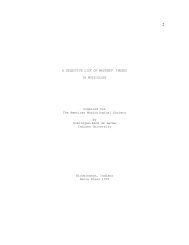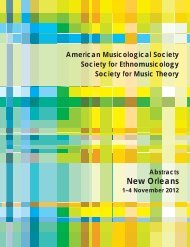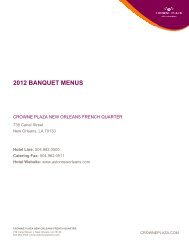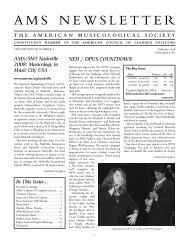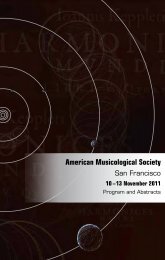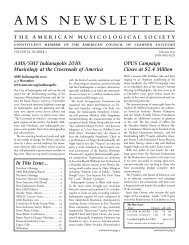AMS Philadelphia 2009 Abstracts - American Musicological Society
AMS Philadelphia 2009 Abstracts - American Musicological Society
AMS Philadelphia 2009 Abstracts - American Musicological Society
Create successful ePaper yourself
Turn your PDF publications into a flip-book with our unique Google optimized e-Paper software.
<strong>Abstracts</strong> Friday afternoon 95<br />
RECOMPOSING MONTEVERDI: ERNST KRENEK’S<br />
L’iNCoroNAZioNe di PoPPeA<br />
Benjamin Thorburn<br />
Yale University<br />
In 1936, Ernst Krenek produced an adaptation of Monteverdi’s L’incoronazione di Poppea<br />
for a repertory company known as the Salzburg Opera Guild to perform on its tour of the<br />
United States the following year. In its first professional performances in the U.S., Monteverdi’s<br />
last opera was presented in a form quite different from that given in its surviving sources,<br />
with a reduced cast of characters, two acts rather than three, and Krenek’s freely contrapuntal<br />
elaboration of the score for modern orchestra. In his review for the New york times, Olin<br />
Downes declared that “a musical antiquarian would be likely to condemn this scoring lock,<br />
stock and barrel,” though the performance as a whole earned his praise. While Krenek revered<br />
Monteverdi’s music for its psychological expressivity, he sought to improve on the weaknesses<br />
he saw in Busenello’s libretto by eliminating scenes and characters that he deemed inessential<br />
to the dramatic action. Key events such as the attempted murder of Poppea were altered, and<br />
in certain places Krenek composed new text. In sum, his revisions surpass the task of a practical<br />
adaptation and amount to a dramatic and musical reshaping of the opera.<br />
Using the musical score as written artifact, I consider how Krenek’s revisions affect our interpretation<br />
of the drama, especially in the characters of Seneca and Drusilla, both of whom<br />
recent scholarship has regarded as central to the opera’s morality. Through his writings on the<br />
adaptation, I show that Krenek’s reconception of the roles of Drusilla and Poppea reflects the<br />
ideal of the “eternal feminine” that prevailed in Viennese literary circles of his time. I also<br />
place Krenek’s incoronazione in relation to the strands of political crisis and controversy in<br />
his career. It occupies a position between two critical events: in 1934, the politically motivated<br />
cancellation of the premiere of his anti-nationalist opera Karl V, and the annexation of Austria<br />
in 1938, which precipitated his emigration to America. Elements of incoronazione resonate<br />
with the later opera Pallas Athene weint (1952–55), to Krenek’s own libretto. Set at the decline<br />
of Athens, it is a political parable in which Socrates, a lone voice of reason and morality not<br />
unlike Seneca, is sentenced to death by a tyrannical ruler.<br />
That such a forward-looking composer as Krenek would take an interest in Monteverdi<br />
may be surprising, but it is far from unique. As a composer who edited or adapted Monteverdi’s<br />
works, he stands among many others including D’Indy, Malipiero, Orff, Dallapiccola,<br />
Henze, and Berio, all of whom sought in some way to move forward by looking to the past.<br />
This paper thus will situate Krenek’s adaptation within this broader context of Monteverdi’s<br />
twentieth-century reception.<br />
REPRODUCING OPERA: EMERGENT<br />
MEANINGS IN JANáčEK ON STAGE<br />
Jennifer Sheppard<br />
University of California, Berkeley<br />
Recently, the most exciting productions of operas have attracted attention by rebelling<br />
against established ideas of the opera’s text and stagings—Peter Sellars’ New York settings<br />
of Mozart operas are just one example among many. Likewise, the most stimulating developments<br />
in opera criticism have been in the area of performance, where a much-needed



